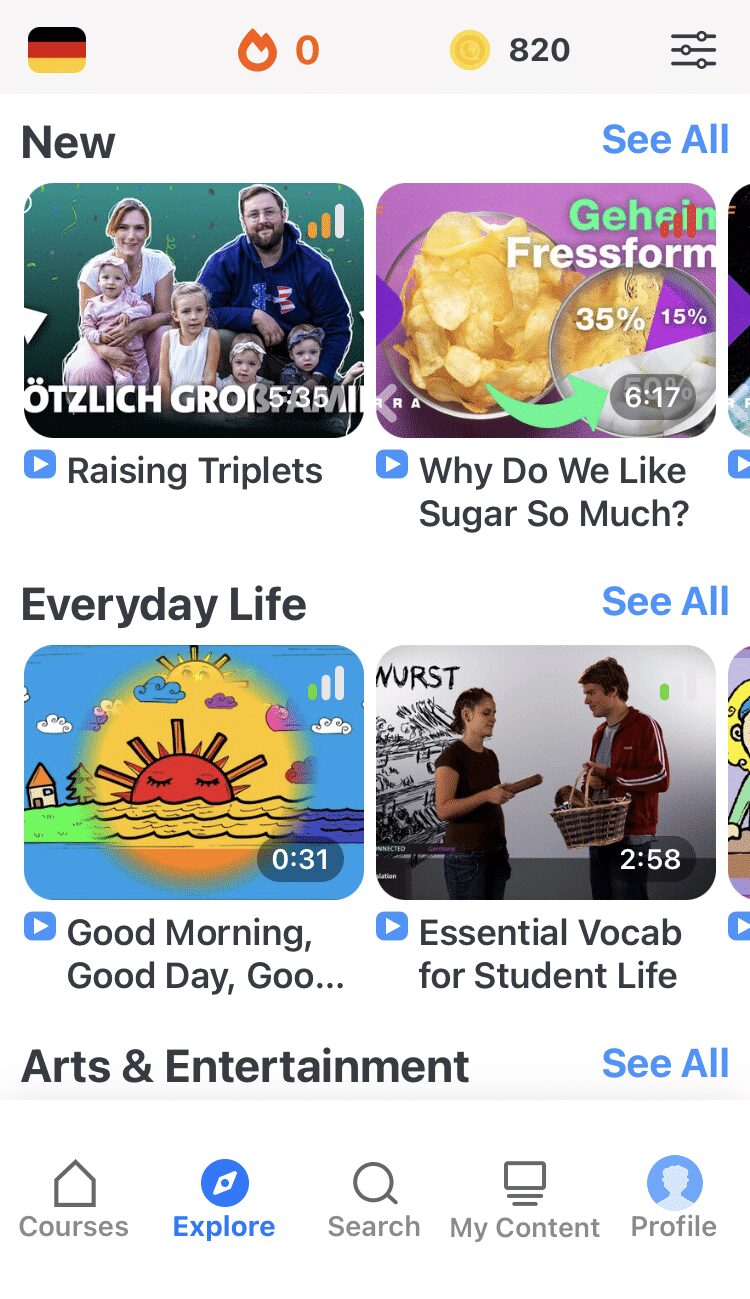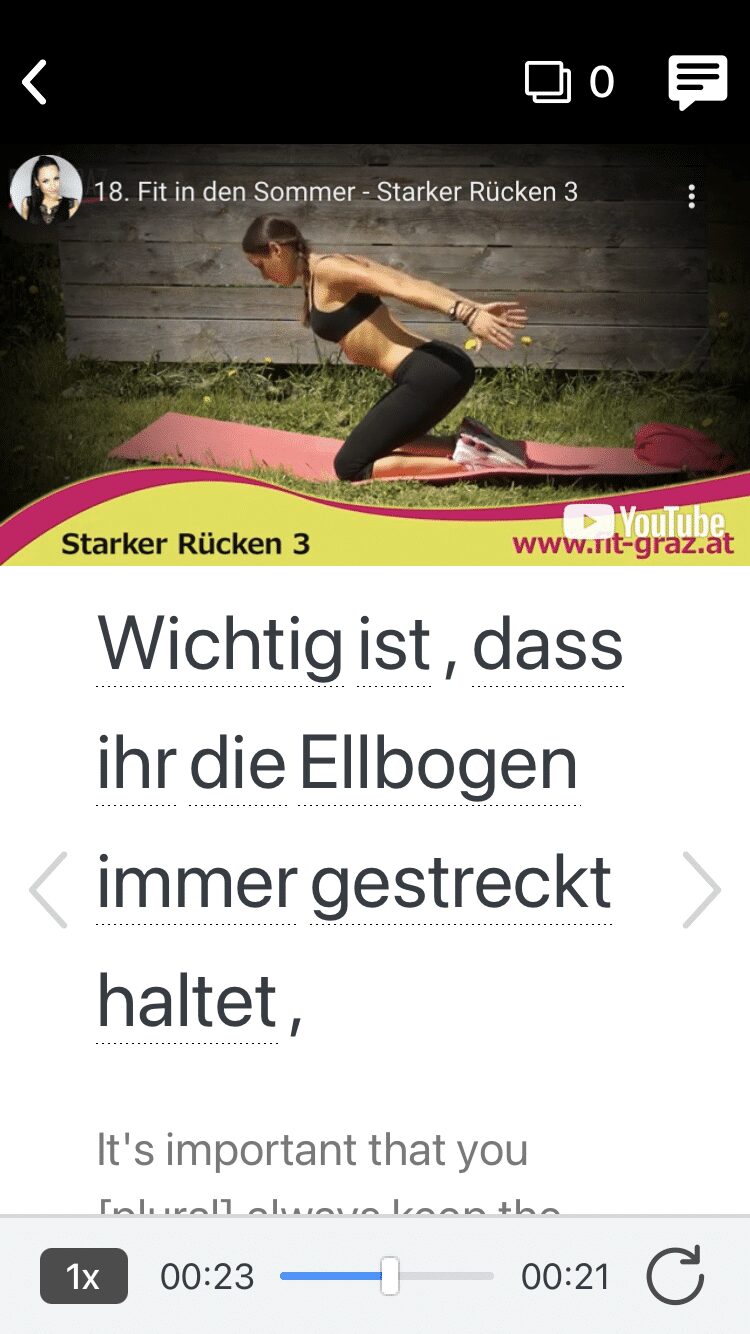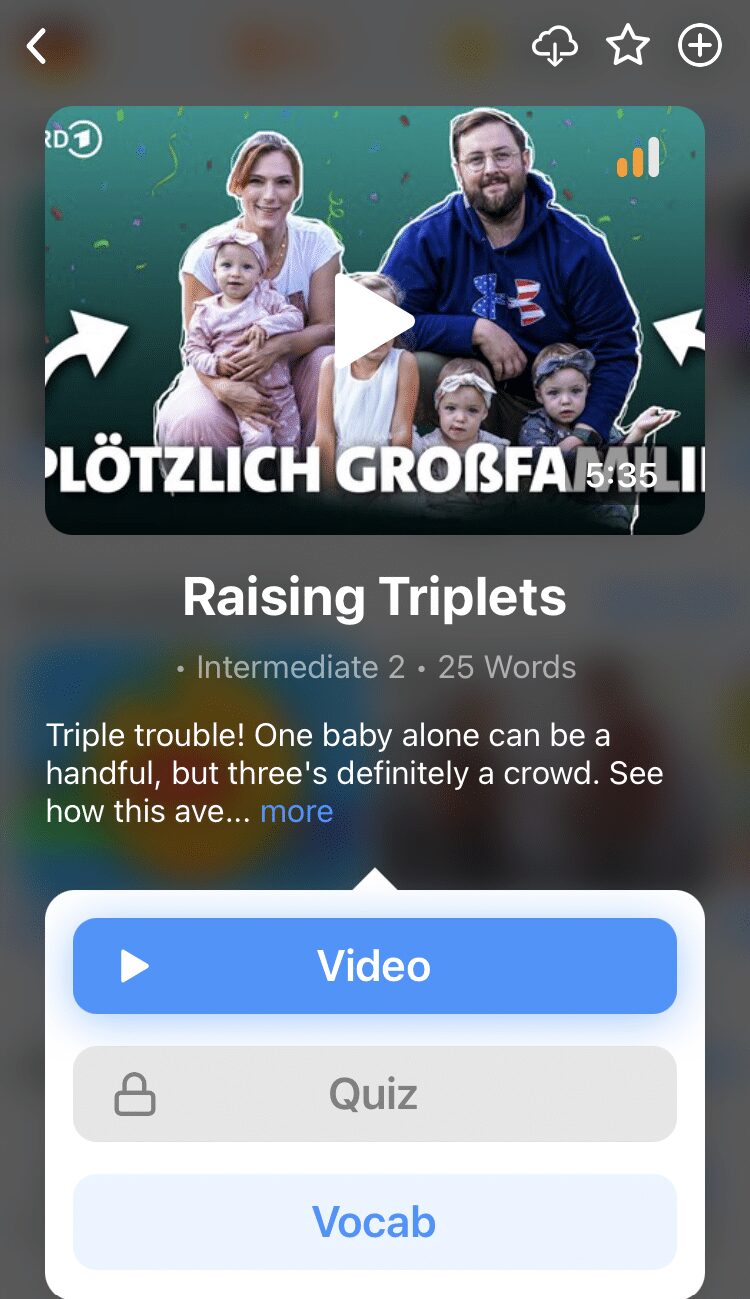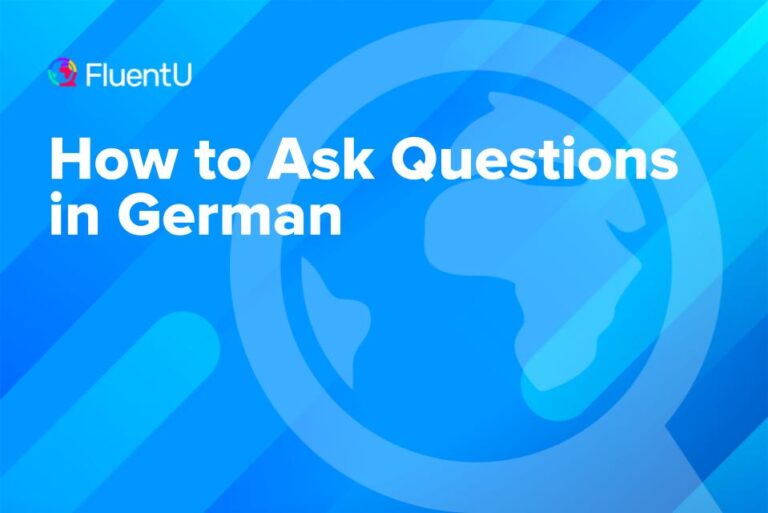100 Most Common German Words

The German language includes hundreds of thousands of words (or millions, depending on how you count them). But, why don’t you start with the 100 most common German words?
These words are used often in conversation, and will get you a long way in understanding and communicating in German.
Download: This blog post is available as a convenient and portable PDF that you can take anywhere. Click here to get a copy. (Download)
Nouns and Articles
Nouns are easy to spot in German sentences. They’re almost always capitalized and attached to an article.
The German articles der (masculine), die (feminine) and das (neutral) all mean “the,” while the articles ein (masculine/neutral) or eine (feminine) mean “a.” The plural article is die.
Calendar Words
All of the days of the week and months of the year are masculine in German, so they take the articles ein/der/die.
| German word | English translation |
|---|---|
| heute (not capitalized or attached to an article) | today |
| der Tag | day |
| die Woche | week |
| das Jahr | year |
| Sonntag | Sunday |
| Montag | Monday |
| Dienstag | Tuesday |
| Mittwoch | Wednesday (translates directly to "middle of the week") |
| Donnerstag | Thursday |
| Freitag | Friday |
| Samstag | Saturday |
| Januar | January |
| Februar | February |
| März | March |
| April | April |
| Mai | May |
| Juni | June |
| Juli | July |
| August | August |
| September | September |
| Oktober | October |
| November | November |
| Dezember | December |
Common Nouns
Here are some of the most common German nouns for family members, places and more:
| German word | English translation |
|---|---|
| die Familie | family |
| der Vater | father |
| die Mutter | mother |
| der Bruder | brother |
| die Schwester | sister |
| das Baby | baby |
| der Sohn | son |
| die Tochter | daughter |
| die Leute | people |
| der Freund | friend |
| die Stadt | city |
| das Haus | house |
| das Ding | thing |
| die Arbeit | work |
| das Geld | money |
| das Essen | food |
Personal Pronouns
As with most languages, personal pronouns are some of the most common words spoken or written, so it’s important to know them well. Here are the German nominative pronouns which are used as subjects of sentences:
| German word | English translation |
|---|---|
| ich | I |
| du | you (informal) |
| Sie | you (formal, singular or plural) |
| er | he |
| sie | she, they |
| es | it |
| wir | we |
| ihr | you (informal, plural) |
As you can see, there are three sie formations. To figure out which pronoun is meant, look at the conjugated verb. If the verb is conjugated to the er/sie/es form, the sie meaning “she” is used. Sie is always capitalized to show it’s formal.
There’s one special pronoun that’s unique to German that might trip up first-time speakers. This pronoun is man and it means the general “you” or “one.” Here are a few examples:
Wie sagt man “suitcase” auf Deutsch? (How do you/does one say “suitcase” in German?)
Wo kann man frisches Essen finden? (Where can one find fresh food?)
Essential Verbs
Verbs are always conjugated depending on the subject and tense of the sentence. You’ll almost always find the verb near the beginning of your phrase. Here are 10 very common German verbs:
| German word | English translation |
|---|---|
| haben | to have |
| sein | to be |
| müssen | to have to / to must |
| können | to be able to / can |
| wollen | to want |
| sagen | to say |
| kommen | to come |
| gehen | to go |
| trinken | to drink |
| essen | to eat |
Adjectives
Adjectives are used to describe nouns, and their endings change to indicate the case of the noun. While adjective endings are a whole lesson in themselves, get started by learning these essential German adjectives to create basic descriptive sentences:
| German word | English translation |
|---|---|
| gut | good |
| schlecht | bad |
| super | super/very cool |
| schön | beautiful |
| hässlich | ugly |
| heiβ | hot |
| kalt | cold |
Numbers 1 Through 20
Don’t forget to learn your German numbers, so you can do everything from making restaurant reservations to catching your train on the right platform.
| German word | English translation |
|---|---|
| eins | one |
| zwei | two |
| drei | three |
| vier | four |
| fünf | five |
| sechs | six |
| sieben | seven |
| acht | eight |
| neun | nine |
| zehn | ten |
| elf | eleven |
| zwölf | twelve |
| dreizehn | thirteen |
| vierzehn | fourteen |
| fünfzehn | fifteen |
| sechsehn | sixteen |
| siebzehn | seventeen |
| achtzehn | eighteen |
| neunzehn | nineteen |
| zwanzig | twenty |
Prepositions
Prepositions are great at linking your ideas together and providing more information. You can use prepositions to describe location, purpose, timing, etc. All prepositions have a case, so check your grammar as you use them!
| German word | English translation |
|---|---|
| nach | after |
| für | for |
| zu | to |
| ohne | without |
| mit | with |
| um | at |
Phrases and Expressions
Words are one thing; being able to complete a thought in German is quite another! Here are some common German phrases you can memorize:
| German word | English translation |
|---|---|
| Hallo! | Hello! |
| Guten Morgen / Guten Tag / Guten Abend | Good morning / Good day / Good evening |
| Wie geht es dir? / Wie geht's? | How are you doing?/How are you? |
| Was machst du? | What are you doing? |
| Wo ist das Badezimmer? | Where's the bathroom? |
| Ich heiβe... | My name is... |
| Danke! | Thank you! |
| Bitte | Please (or "You're welcome" when said after danke) |
| Entschuldigung | Excuse me |
| Auf Wiedersehen! | Goodbye! |
Bonus: Common Idioms
Idioms are the best way to pick up on any new language and learn more about the culture. Here are a few commonly used German idioms that might come in handy:
“To press the thumbs.” This is the German version of “cross your fingers.” Sometimes, just like Americans do, the Germans will actually perform the action and press their thumbs.
“Du nimmst mich auf den Arm!”
“You hold me by the arm!” Very similar to “pulling one’s leg,” this German phrase translates to something like “no way” or “you’re kidding me.”
“Wer nicht vorwärts geht, der kommt zurück.”This translates roughly to “whoever isn’t going forward is going backward.” It’s a German saying that promotes proactive behavior and movement toward the future, whatever it may be.
“Alles hat ein Ende, nur die Wurst hat zwei.”
Because what is Germany without Wurst? Germans who say this mean everything has an end, and only a sausage has two. Basically, whatever is going on will come to an end sooner or later.
“Alles Gute zum Geburtstag!”
This means “Everything good to you on your birthday.” Rather than say “Happy Birthday,” this is what Germans might call you up and say when you’re another year older.
“Frosch im Hals haben.”Meaning to have “a frog in one’s throat,” this phrase refers to a coarse voice.
“Noch grün hinter den Ohren sein.”To still be green behind the ears. Those of us who are still new to something might’ve heard this from our older or more experienced colleagues.
Why Learn the 100 Most Common German Words
Knowing common words and phrases in German will help you in many ways. For one thing, you’ll have a starting point to converse with native German speakers, which is one of the most important and effective ways to actually get fluent in the language.
You’ll be able to understand essential questions and express basic needs and desires. You’ll also be prepared to move on to more complex German structures, including those pesky grammar rules and the ever-confusing—but incredibly entertaining—idioms.
As your memorization momentum builds, your confidence will grow, too. You might find that you get hooked on vocabulary building!
One great way to take advantage of that momentum is to use FluentU.
FluentU takes authentic videos—like music videos, movie trailers, news and inspiring talks—and turns them into personalized language learning lessons.
You can try FluentU for free for 2 weeks. Check out the website or download the iOS app or Android app.
P.S. Click here to take advantage of our current sale! (Expires at the end of this month.)
And you’ll be sure to encounter many of the 100-plus words listed above!
There you have it! Try out these words and phrases next time you have a chance and always remember to practice your German!
Download: This blog post is available as a convenient and portable PDF that you can take anywhere. Click here to get a copy. (Download)
And One More Thing...
Want to know the key to learning German effectively?
It's using the right content and tools, like FluentU has to offer! Browse hundreds of videos, take endless quizzes and master the German language faster than you've ever imagine!
Watching a fun video, but having trouble understanding it? FluentU brings native videos within reach with interactive subtitles.
You can tap on any word to look it up instantly. Every definition has examples that have been written to help you understand how the word is used. If you see an interesting word you don't know, you can add it to a vocabulary list.
And FluentU isn't just for watching videos. It's a complete platform for learning. It's designed to effectively teach you all the vocabulary from any video. Swipe left or right to see more examples of the word you're on.
The best part is that FluentU keeps track of the vocabulary that you're learning, and gives you extra practice with difficult words. It'll even remind you when it’s time to review what you’ve learned.
Start using the FluentU website on your computer or tablet or, better yet, download the FluentU app from the iTunes or Google Play store. Click here to take advantage of our current sale! (Expires at the end of this month.)












